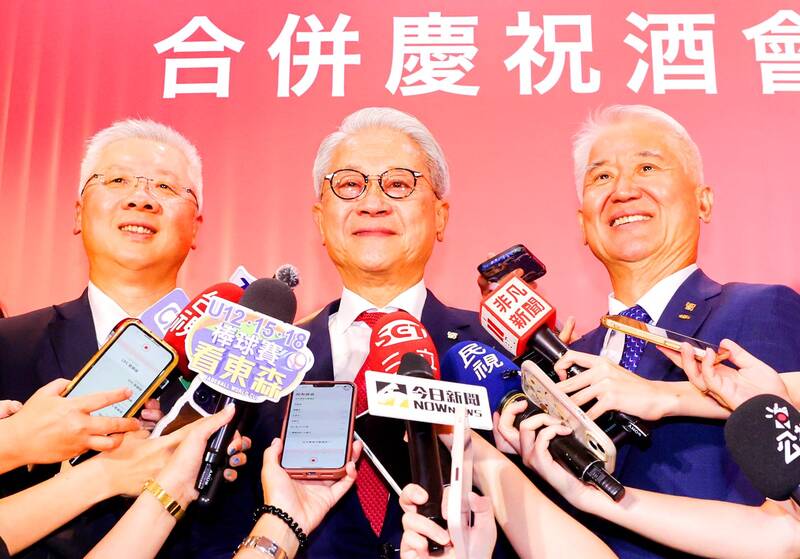Taishin Financial Holding Co (台新金控) and Shin Kong Financial Holding Co (新光金控) yesterday finalized their long-anticipated merger, creating TS Financial Holding Co (台新新光金控), whose combined assets make it the fourth-largest financial holding company in Taiwan.
The new entity, with NT$8.3 trillion (US$282.3 billion) in assets, more than 10 million clients and over 1 million shareholders, aims to become a globally competitive financial group, chairman Thomas Wu (吳東亮) said at a celebration event in Taipei.
“This merger is not just about scale — it is about creating a new growth engine for Taiwan’s financial sector,” Wu said, adding that TS Financial would pursue a “multi-engine” model integrating banking, insurance, asset management and securities to drive balanced development.

Photo: CNA
While the legal merger takes effect immediately, operational integration across subsidiaries is expected to take up to a year, as the group works toward building a unified platform.
The merger marks Taiwan’s largest-ever friendly acquisition in the financial sector by transaction value, and signals a broader shift toward consolidation and scale.
TS Financial now controls 557 branches, 5,000 ATMs and a workforce of 32,000, and operates the most widely used digital banking platform in the nation.
Domestically, Wu said that the company plans to consolidate Taishin International Bank Co (台新銀行) and Shin Kong Commercial Bank Co (新光銀行) into the country’s largest retail banking network, in terms of the number of branches and digital user base.
In the insurance field, 60-year-old Shin Kong Life Insurance Co (新光人壽) is to remain a core subsidiary, with plans to bolster its capital strength and long-term policyholder protection, Wu said.
International expansion, particularly in Asia, is a key goal, Wu said, adding that the group is exploring cross-border opportunities to align with global companies increasingly seeking partnerships with Taiwan.
Citing his role as chairman of the Chinese National Association of Industry and Commerce, Wu said: “Now is the best time for Taiwanese firms to step out and compete internationally. Taiwan’s financial sector must achieve sufficient scale to serve as a strong and reliable backing for our businesses abroad.”
The integration process has already begun. On the asset management front, Taishin Securities Investment Trust Co (台新投信) yesterday approved a share swap to absorb Shin Kong Investment Trust Co (新光投信), marking the first subsidiary consolidation.
Taishin Trust plans to issue 53.37 million new shares to its parent company in exchange for Shin Kong Trust shares, at a ratio of 1.3342 Taishin shares for each Shin Kong share — pending regulatory approval.
Despite optimism about long-term synergies, investors took a cautious stance. Shares of TS Financial dropped 6.3 percent to NT$16.3 yesterday on heavy volume, as the market digested the near-term integration challenges and restructuring costs.

NEW IDENTITY: Known for its software, India has expanded into hardware, with its semiconductor industry growing from US$38bn in 2023 to US$45bn to US$50bn India on Saturday inaugurated its first semiconductor assembly and test facility, a milestone in the government’s push to reduce dependence on foreign chipmakers and stake a claim in a sector dominated by China. Indian Prime Minister Narendra Modi opened US firm Micron Technology Inc’s semiconductor assembly, test and packaging unit in his home state of Gujarat, hailing the “dawn of a new era” for India’s technology ambitions. “When young Indians look back in the future, they will see this decade as the turning point in our tech future,” Modi told the event, which was broadcast on his YouTube channel. The plant would convert

‘SEISMIC SHIFT’: The researcher forecast there would be about 1.1 billion mobile shipments this year, down from 1.26 billion the prior year and erasing years of gains The global smartphone market is expected to contract 12.9 percent this year due to the unprecedented memorychip shortage, marking “a crisis like no other,” researcher International Data Corp (IDC) said. The new forecast, a dramatic revision down from earlier estimates, gives the latest accounting of the ongoing memory crunch that is affecting every corner of the electronics industry. The demand for advanced memory to power artificial intelligence (AI) tasks has drained global supply until well into next year and jeopardizes the business model of many smartphone makers. IDC forecast about 1.1 billion mobile shipments this year, down from 1.26 billion the prior

People stand in a Pokemon store in Tokyo on Thursday. One of the world highest-grossing franchises is celebrated its 30th anniversary yesterday.

Zimbabwe’s ban on raw lithium exports is forcing Chinese miners to rethink their strategy, speeding up plans to process the metal locally instead of shipping it to China’s vast rechargeable battery industry. The country is Africa’s largest lithium producer and has one of the world’s largest reserves, according to the US Geological Survey (USGS). Zimbabwe already banned the export of lithium ore in 2022 and last year announced it would halt exports of lithium concentrates from January next year. However, on Wednesday it imposed the ban with immediate effect, leaving unclear what the lithium mining sector would do in the